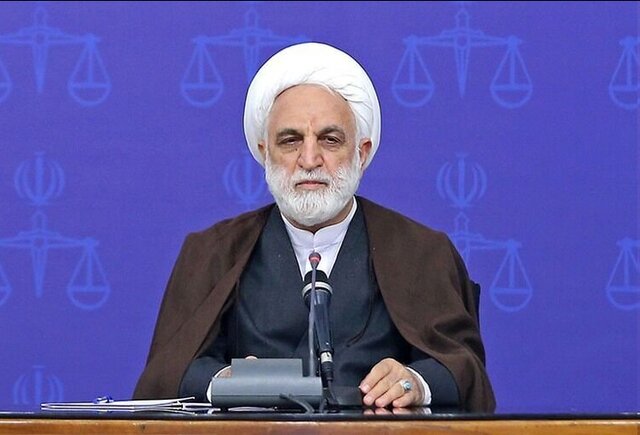The head of the judiciary said in an expert meeting to review the problems related to Article 477: “I personally believed and seek to shorten some complex and corrupt processes with the cooperation of the government and parliament.” To reduce the problems of the people as the structure of the judiciary becomes more transparent, agile and efficient.
People’s Problems In the period of “Transformation and Excellence”, an expert meeting was held on the subject of “Causes and factors of the formation of Article 477 cases”.
Article 477 is a request for a retrial to the head of the judiciary in cases in which a verdict is alleged to have been issued in violation of Islamic law.
At the beginning of the meeting, Hojjat-ul-Islam Wal-Muslimin Mortazavi Moghaddam, the head of the Supreme Court, presented a report on the latest statistics of current cases related to Article 477 and the process of reviewing them, saying that this article has become a problem for the Supreme Court.
He noted that the number of requests for retrial under this article was increasing and delayed, noting that a significant portion of these requests were based on erroneous grounds and could not be pursued at all, in the spirit of the law, which is limited. It is against the law to re-examine the rulings, it is contradictory.
At the meeting, the head of the judiciary emphasized the need for professional and technical input to find the root of the challenges in the country’s judicial system, noting that complex laws and processes inside and outside the judiciary have been troublesome to the people and have led to corruption and slowness. Should be corrected.
Hojjat-ul-Islam and Muslims Mohseni Ejei said: “I personally believed and I seek to shorten some complex and corrupt processes with the cooperation of the government and parliament in order to reduce the problems of the people with more transparent, agile and efficient structures.
He pointed to the complexities of the tax law and the licensing process, for example, and said that the long and layered processes in these areas, in addition to creating problems for the people, are certainly corrupting.
The head of the judiciary referred to Article 477 as one of the most complex judicial processes and, emphasizing the need to facilitate this process, explained the path taken to correct this process and stated: In one period, specialized branches will consider the request. There was a retrial, which was later found to be ineffective.
Mohseni Ejei added: “At another point, the issue of Article 18 was raised, which stated that if a ruling was contrary to the Shari’a and the law, it should be reconsidered, but later the question arose as to who and what authority ruled that the vote was illegal.” Where is it?
He continued: “At that time, assuming that rulings against Sharia law should be rare, it was said that it is up to the head of the judiciary to decide, but when the demand for retrial increases, the head of the judiciary certainly can not do everything himself.” Read the files.
The head of the judiciary stated that in these circumstances, the head of the judiciary has to leave the case to the trusted and experienced judges if they are not among the non-delegated issues, and he himself, without studying the case, will give their opinion. Sign.
Mohseni Ejei added: “At one time, the then head of the judiciary did the same thing, but due to the sensitivity of the issue and the need to do so by people with accurate understanding and inference, who sometimes have to tell the expert about his expert opinion.” Explain the power that would prolong the long-term process.
The head of the judiciary, stating that “prolongation of the process of applying Article 477 causes dissatisfaction among the people”, raised the question of why a judge should issue a verdict that is contrary to Islamic law, and why in some cases, this Can the problem be repeated?
If the judge issues a ruling contrary to Islamic law, he should be questioned and held accountable in the relevant authorities.
Mohseni Ejei, meanwhile, said that sometimes there is a difference of opinion on an issue and that a judge may have an opinion that differs from that of another judge, which cannot be considered contrary to Islamic law.
The head of the judiciary considered unacceptable the continuation of the implementation of Article 477 of the law with the current conditions of long-term and complex proceedings.
In this meeting, Hojjatoleslam and Muslims Mossadegh, First Deputy of the Judiciary, Hojjatoleslam Ghodrati and Rahimi, Legal and Judicial Deputies of the Judiciary, and Hojjatoleslam and Muslims Montazeri, Attorney General, also presented their views on Article 477 and how it can be implemented and The field did.
Emphasizing the need to rectify this process, the head of the judiciary called on the Deputy Judiciary and the President of the Supreme Court to consider cases under Article 477 on a non-electoral basis, and to deal with cases involving a provincial court or judge. During a month or a few months, a branch that has been found to be in violation of Islamic law should seriously pursue the matter and ask the relevant judge for the reason.
Hojjat-ul-Islam and Muslims Mohseni Ejei also instructed the Legal Deputy of the Judiciary, with the help of other judicial departments and using the opinions of experts and members of the Judiciary Commission, to examine the causes and factors of Article 477 petitions and provide corrective solutions on how to implement this article. کردن. P>
End of message

دیدگاهتان را بنویسید لغو پاسخ